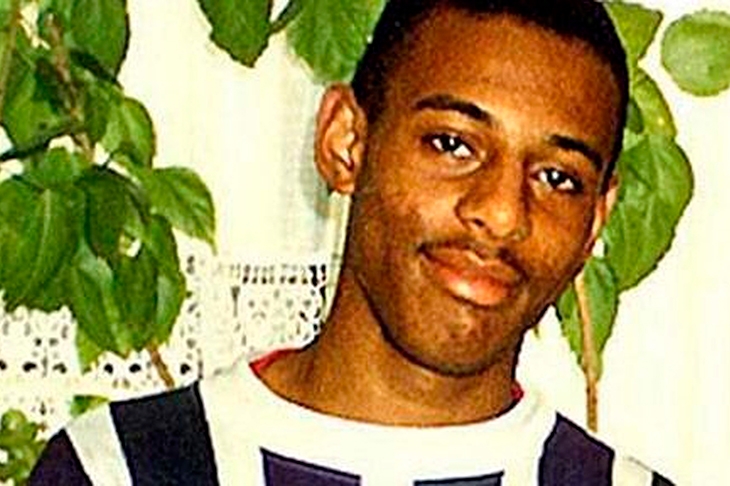Sir William Macpherson of Cluny has died. His obituaries praise him for his 1998 inquiry into the Stephen Lawrence case. His report did indeed shed light on the failure of the police to catch the young man’s killers. It has had, however, a profound and bad effect on our law. The report’s recommendations redefined a racist incident: ‘A racist incident is any incident which is perceived to be racist by the victim or any other person.’ This definition means that absolutely anything in the world could be a racist incident, because it relies wholly on what a complainant ‘perceives’. The definition’s use of the word ‘victim’ also implies acceptance that every person who claims to be a victim is one. This short-circuits the duty of the law to establish the facts. And if a racist incident is thus defined, it follows that anyone who denies that a racist incident took place is rejecting the ‘perception’ of racism and is therefore himself racist, at least ‘unconsciously’ or ‘institutionally’ so. From this perception doctrine has flowed a vast new body of law and practice which concerns not only race but other ‘hate crimes’ about religion, sexuality, sex and gender etc. It has also helped create the climate — in sex abuse claims, for instance — of believing the ‘victim’ without proper evidence. As was obvious, though widely denied, from the first, this was bound to empower false accusations. We have seen case after case — most famously Carl Beech, fanned by Tom Watson — in which this has caused appalling pain and injustice. We have also seen consequent bad processes deployed as weapons in unrelated disputes. Thus Christ Church, Oxford, obsessed with getting rid of its Dean, Martyn Percy, belatedly raised ‘safeguarding’ issues to try (unsuccessfully) to discredit him. I am afraid the Macpherson Report got all this going. Sir William, an upright judge, did not intend this, but it has happened. To put it simply, it undermines one of the most basic principles of the rule of law — the presumption of innocence.
More from my friend the frontline doctor as Covid admissions in his hospital fall to ‘almost zero’: ‘Morale is soaring. We finally have the space and time to do our jobs well. I am able to focus on each patient I see, one at a time. I can spend the time each case demands and start considered investigations and effective treatment of which I can be proud in the morning handover. Previously, I only had time to stabilise each patient and start the most basic treatment before moving on to the next.’ This made him feel that ‘I had failed each as individuals in order to preserve the majority’. Now: ‘The pleasure of being able to practise good, thorough, holistic medicine after so long treading water may be similar to being able to write a finely crafted article after months of having been limited to only tweets. The vaccination programme has been simply miraculous in its effects. At handover this morning my Mediterranean consultant threw his hands in the air in delighted disbelief: “Empty beds! There are empty beds and no patients waiting to come in? Six weeks ago we were drowning in a tsunami and now the tide has receded so far that we cannot even see the ocean! What a crazy year!” The smiles on each face somehow shone through our masks in a moment of pure, shared joy.’
The joyful doctor also makes an interesting point about Covid statistics. Some people, he says, are only ‘technically’ Covid-positive, because the PCR test ‘doesn’t discriminate between active and recent Covid infections’. He wonders if inclusion of the latter might be artificially inflating the national figures for new cases.
This week the Education Secretary, Gavin Williamson, announced plans to impose a legal duty to protect free speech in universities. Just now I feel in no mood to listen to Mr Williamson on anything to do with freedom. Because of his restriction order on Ampleforth College, the Catholic boarding school, which means it cannot take new pupils next year, he leaves no time for the school to complete the reforms it has already implemented. So, unless he hurries, he will shortly kill a free educational and religious institution. We need not so much laws which enforce freedom, as a culture which lets freedom flourish. Astonishing that a Conservative is trashing that culture.
There are 45 churches within the City of London but, because of ecclesiastical timidity about Covid, only two of them are currently open. One is St Bartholomew the Great, Smithfield, the oldest parish church in any part of London (it will be 900 years old in 2023). Its rector, Marcus Walker, has written in this paper about the added importance of ministry during the lockdown. On Monday night, with the actor Robert Bathurst beautifully reading the poem, I was with Fr Walker in his church to deliver my talk on Gray’s ‘Elegy Written in a Country Churchyard’ to the VAGM (Virtual Annual General Meeting) of the Rectory Society, which I chair. The Elegy was first published on that very day — 15 February — 250 years ago. My theme was Gray’s shift from the classical to the romantic in one poem. So quiet is the City in this plague year that a modern Gray could almost equally well compose the work in a City churchyard, though there would obviously be no ploughman homeward plodding his weary way. Our live performance was exciting. A minute before we went on air, a vital cable failed, and we had to delay by 15 minutes. When we finally did appear, I leant against the lectern which I had placed on top of hassocks to get my script at the right eye-level. It slipped from under me and I had to spend the next 40 minutes — surreptitiously, I hope — holding it up. The talk, including the errant lectern, can be seen on the Rectory Society website or spectator.co.uk/rectory, I believe, though I have not dared to watch. Our membership of more than 600 has hardly fallen at all during the lockdown, but of course new members are always welcome…
Got something to add? Join the discussion and comment below.
Get 10 issues for just $10
Subscribe to The Spectator Australia today for the next 10 magazine issues, plus full online access, for just $10.
You might disagree with half of it, but you’ll enjoy reading all of it. Try your first month for free, then just $2 a week for the remainder of your first year.















Comments
Don't miss out
Join the conversation with other Spectator Australia readers. Subscribe to leave a comment.
SUBSCRIBEAlready a subscriber? Log in